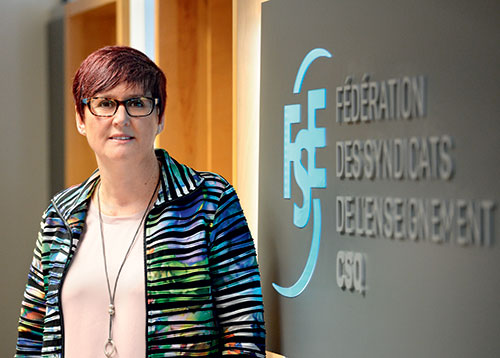The Minister of Education, Jean-François Roberge, announced on October 21, 2021 the main components of the new Culture and Citizenship in Québec program, which will replace the Ethics and Religious Culture (ERC) program in fall 2023.* And the minister did so in the absence of teachers, but in the company of a few public personalities on hand to show support for the new program.
Not one education professional was in attendance at the time of the announcement to endorse the new program, which will be built on three components (culture, citizenship in Québec and dialogue and critical thinking) and for which the government plans to earmark $3 million for the training of teaching staff. Yet in a sense, this is fortunate news, according to the President of the Fédération des syndicats de l’enseignement (FSE-CSQ), Josée Scalabrini, because teachers usually have to scramble to make sure training is provided.
An expected, foreseeable overhaul

ERC is an unpopular subject, a subject with societal, if not political aims. Teaching time allotted for the subject is often slashed to the minimum. Abolition of the program was one of the election campaign promises of the Coalition avenir Québec (CAQ). It comes as no surprise that the government announced in 2019 that it would hold consultations on the matter.
However, the Ministère de l’Éducation’s decision to launch, in winter 2020, moreover for the first time, a province-wide public consultation, rather than seek advice from program experts, including teachers, was “highly questionable, to say the least, if not dubious,” says Josée Scalabrini.
Yet the teachers concerned seem to be on the same wavelength as the government. Data gathered from these teachers during a consultation led by the FSE-CSQ indicate that close to 85% are in favour of the assessment process, a matter of reviewing problematic areas, but also of maintaining components of content that are still relevant.
Eight themes were advanced without any assessment of the ERC program and with no consideration of the teachers’ opinions or expertise. Although the teachers are in favour of the overhaul, nevertheless they would have preferred to be associated with a process they had hoped would be more thorough.
Mishmash program content?
The government declared that the new Culture and Citizenship in Québec program will deal with issues affecting culture in Québec, as well as the evolution and the works of this culture. It will also cover aspects of civic life, such as self-respect and respect for others, equality, environmental issues and freedom of expression in the digital era. The objective is to encourage young people to engage in critical thinking about societal issues. The ambitious menu will also include sexuality education and issues relating to Indigenous peoples.
“We have to make sure that the program doesn’t turn into a mishmash response to society’s ills and that the subject-time allocation is sufficient to cover all the program content,” states Josée Scalabrini. “If this program is as important as we have been told it is, prescribing the minimum time to be allocated to it is essential.”
The drafting of the program must not be subject to any political bias. “Only when we are apprised of the program content, which is to be unveiled in spring 2022, will we be able to assess whether the government has exploited it for political purposes,” she adds.
From words to action
At the FSE-CSQ, people say they hoped for greater consistency between discourse and practice on the part of the government, which claims it wants to value teachers. “This government should make sure to have all the ingredients it requires to successfully implement the new program, based on dialogue. This begins with respecting teachers, involving them in the process and listening to what they have to say about next steps,” Josée Scalabrini concludes.
What does the FSE-CSQ recommend?
Based on the opinions expressed by the teachers consulted, here are the recommendations that the Federation made on several occasions from the start of the consultations:
- With teaching staff, carry out an assessment of the implementation of the ERC program
- Avoid turning the new program into a mishmash by limiting the number of themes
- Highlight the theme of Personal Development and Interpersonal Relationships in the program at the elementary school level
- Highlight the Ethics theme in the program for the secondary school level
- Ensure that the teaching of the program be entrusted to a specialist in elementary school
- Define a minimum prescribed time period allocated to the teaching of the program
- Provide training based on the needs of teachers
- Allow time for experimenting and becoming familiar with the program
The Culture and Citizenship in Québec program will be implemented on a volunteer basis in September 2022, then officially implemented in fall 2023.
